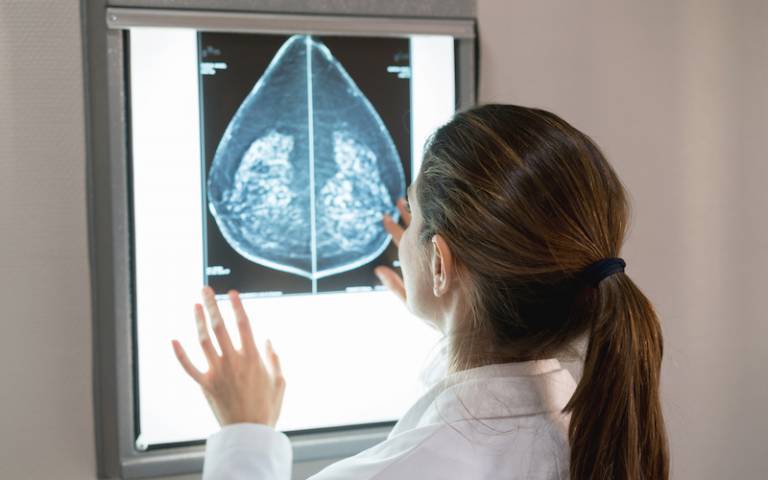Single-dose radiotherapy found effective for treating breast cancer
21 August 2020
The long-term clinical trial, designed and run by UCL, involved 32 hospitals and medical centres in ten countries

A pioneering breast cancer therapy developed by UCL clinicians, which requires just one shot of radiotherapy rather than conventional weeks-long treatment, has proven to be as effective for most women in treating the disease.
The findings of the large international randomised trial, published in the BMJ, confirm the long-term effectiveness of Targeted Intraoperative Radiotherapy (TARGIT-IORT): a breast cancer treatment which is increasingly available throughout the world.
TARGIT-IORT is delivered immediately after lumpectomy (tumour removal), via a small ball-shaped device placed inside the breast, directly where the cancer had been. The single-dose treatment lasts for around 20 to 30 minutes and replaces the need for extra hospital visits, benefiting both patient safety and well-being.
Conventional external beam radiotherapy (EBRT) is delivered from outside the body via a radiotherapy machine (linear accelerator), and consists of a daily treatment session (known as fractions) to the whole breast, over a period between three to six weeks. Each of these treatments is given over a few minutes, but requires 15 to 30 hospital visits, which could be a significant distance from where the patient lives.
To establish TARGIT-IORT’s long-term effectiveness, 2,298 women aged 45 or over with invasive ductal carcinoma (breast cancer) and a tumour of up to 3.5cm in size, were randomly assigned to receive either TARGIT-IORT or the traditional EBRT.
This large clinical trial, designed and run from UCL, involved 32 hospitals and medical centres in ten countries: the UK, France, Germany, Italy, Norway, Poland, Switzerland, United States, Canada and Australia. The trial started in March 2000, which has enabled researchers to publish these long-term results.
The findings show that with TARGIT-IORT therapy, eight out of every ten patients had no need for any further post-operative radiotherapy treatments. There was also no detriment to survival and no increase in the likelihood of the cancer returning.
In addition, with TARGIT-IORT, significantly fewer women died from causes other than breast cancer. Previous studies have shown that TARGIT-IORT has fewer radiation-related side effects compared with conventional whole breast radiotherapy, with less pain, better cosmetic outcome and a better quality of life.
Lead author, Professor Jayant Vaidya, (Professor of Surgery and Oncology, UCL Surgery & Interventional Science), said: “With TARGIT-IORT, women can have their surgery and radiation treatment for breast cancer all at the same time.
“This reduces the amount of time spent in hospital and enables women to recover more quickly, meaning they can get back to their lives more quickly.
“With publication of these very positive long-term results, it is now clear that this treatment should be made much more freely available. It should be accessible to healthcare providers and discussed with patients when surgery for breast cancer is being planned.”
Results
Between March 2000 and June 2012, 1,140 patients were randomised to TARGIT-IORT and 1,158 to whole breast radiotherapy (EBRT).
At the five-year follow up, recurrence risk of localised breast cancer was 2.1% (24/1140 patients) for TARGIT-IORT compared to 0.95% (11/1158 patients) for EBRT. This difference (1.16%) in recurrence risk is very small and clinically insignificant, concluding that TARGIT-IORT is non-inferior to EBRT. There were 14 fewer deaths (42/1140 v 56/1158) for TARGIT-IORT compared with EBRT.
Significantly, at long-term follow up (average 8.6 years, maximum 18.9 years) there was no statistically significant difference found in any of the breast cancer outcomes, and there was a substantial reduction in deaths from causes other than breast cancer with TARGIT-IORT.
Co-author, Professor Michael Baum (UCL Surgery & Interventional Science), said: “These results are the highest level of evidence proving not only the effectiveness of TARGIT-IORT but confirming that it avoids deaths from other causes. I am pleased that it will benefit thousands of breast cancer patients around the world.”
Co-author, Professor Jeffrey S Tobias (Professor of Clinical Oncology, UCL & UCLH) said: “With TARGIT-IORT, a large proportion of patients with breast cancer will never need to make the repeated daily visits to the radiotherapy centre. They avoid side effects of whole breast radiotherapy. Importantly, TARGIT-IORT reduces the burden on overstretched radiotherapy departments.”
The TARGIT-IORT technique was developed by clinical academics, Professors Vaidya, Tobias and Baum, in 1998 in collaboration with the manufacturers.
During the past 20 years this method has been used worldwide in over 260 medical health centres in 38 countries, helping to treat more than 45,000 patients.
Funding for the trial was provided by the National Institute for Health Research (NIHR) Health Technology Assessment programme, UCL Comprehensive Biomedical Research Centre, and Cancer Research UK.
Links
- Research paper published in the BMJ
- Professor Jayant Vaidya's academic profile
- UCL Surgery & Interventional Sciences
- UCL/UCLH Biomedical Research Centre
- NIHR
- Cancer Research UK
Media Contact
Henry Killworth
Tel: +44 (0) 7881 833274
E: h.killworth@ucl.ac.uk
For the latest news about UCL’s international activity, partnerships and opportunities, subscribe to our bimonthly Global Update newsletter.
 Close
Close

